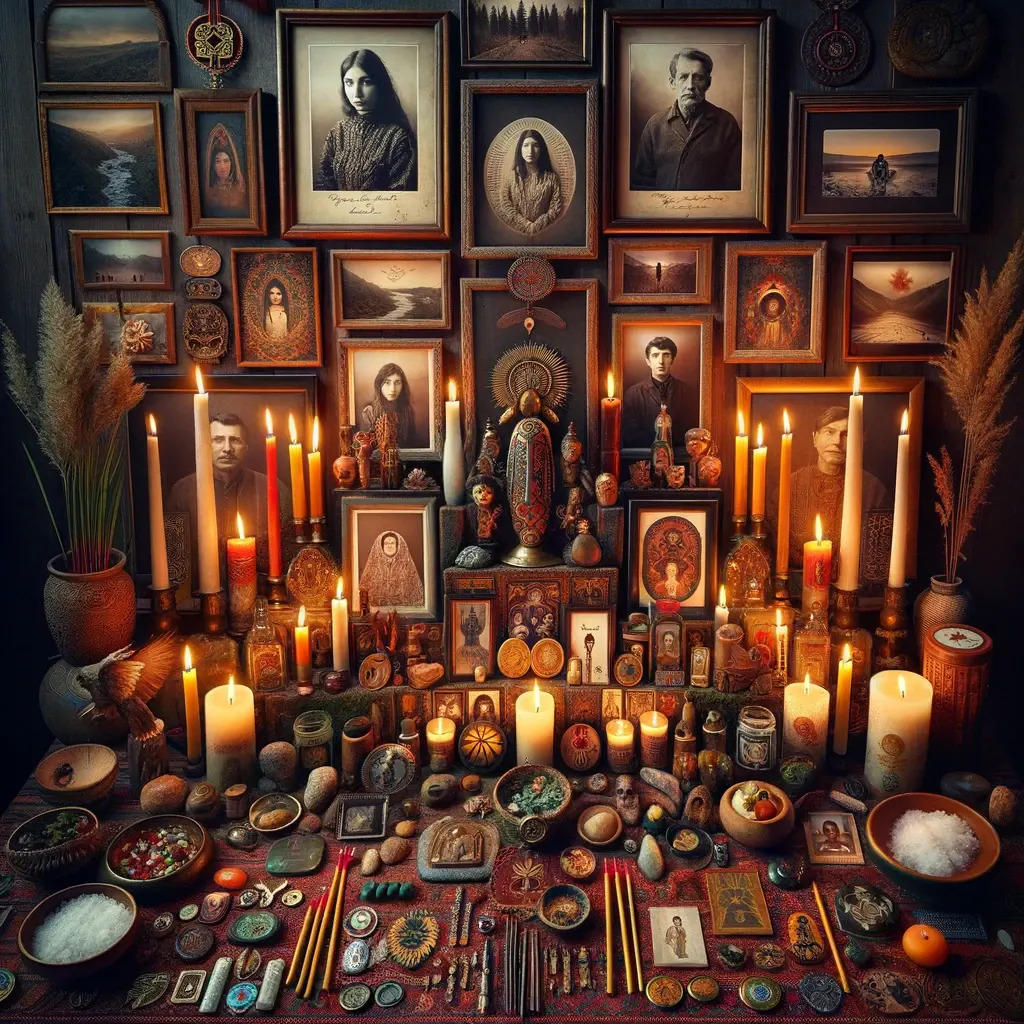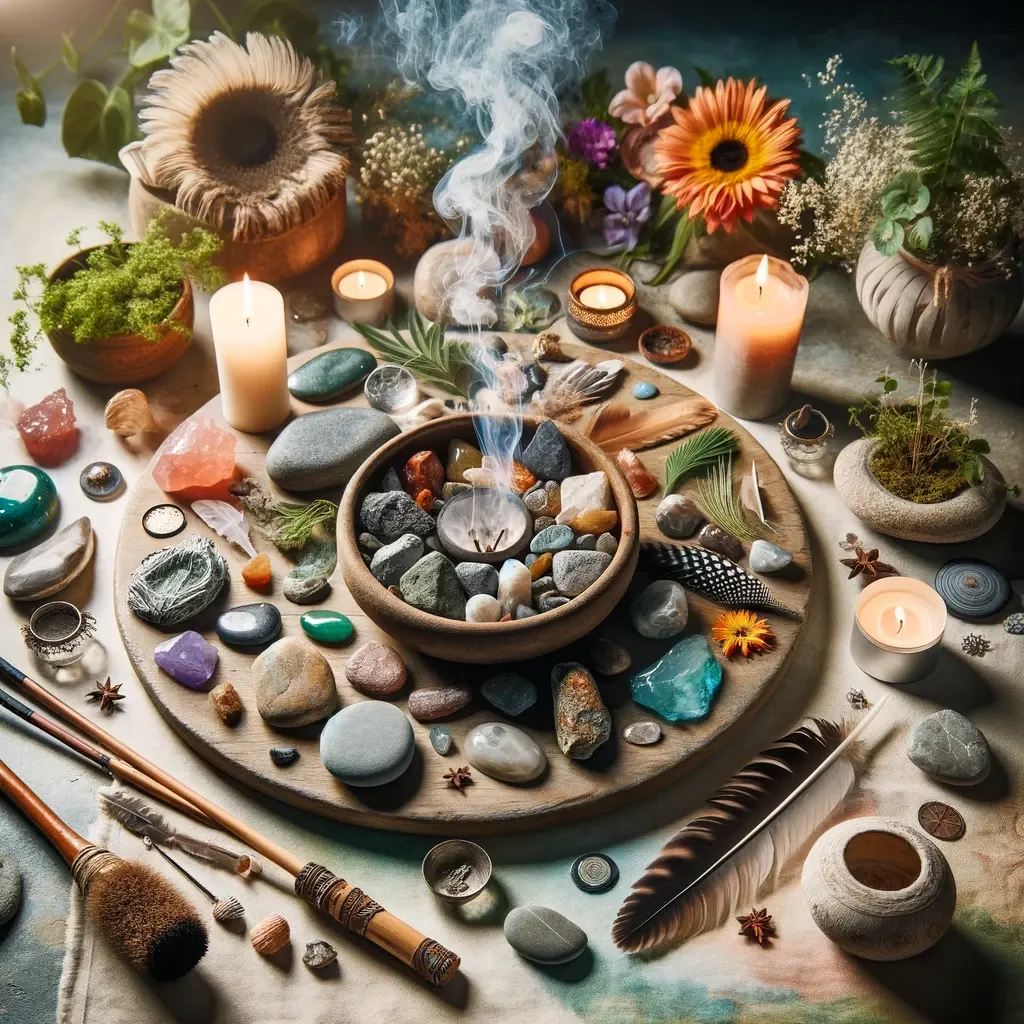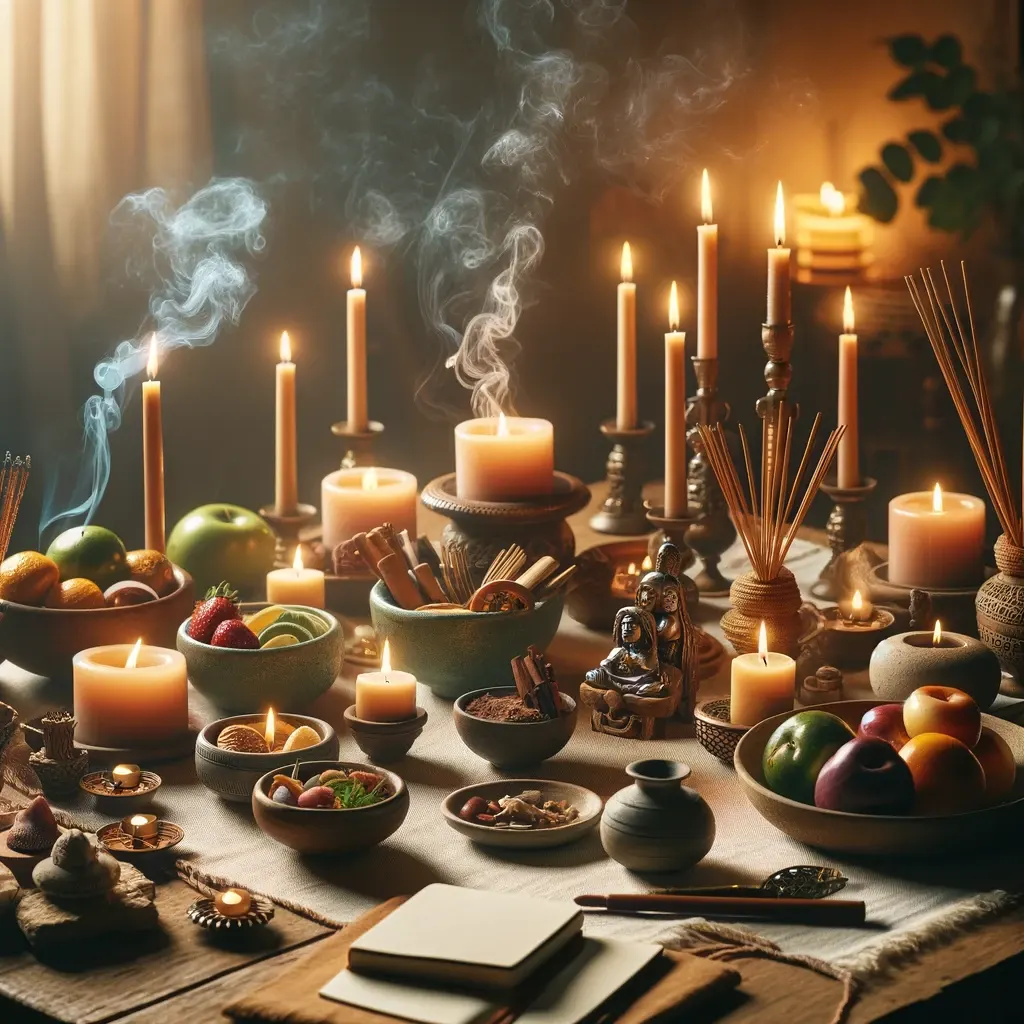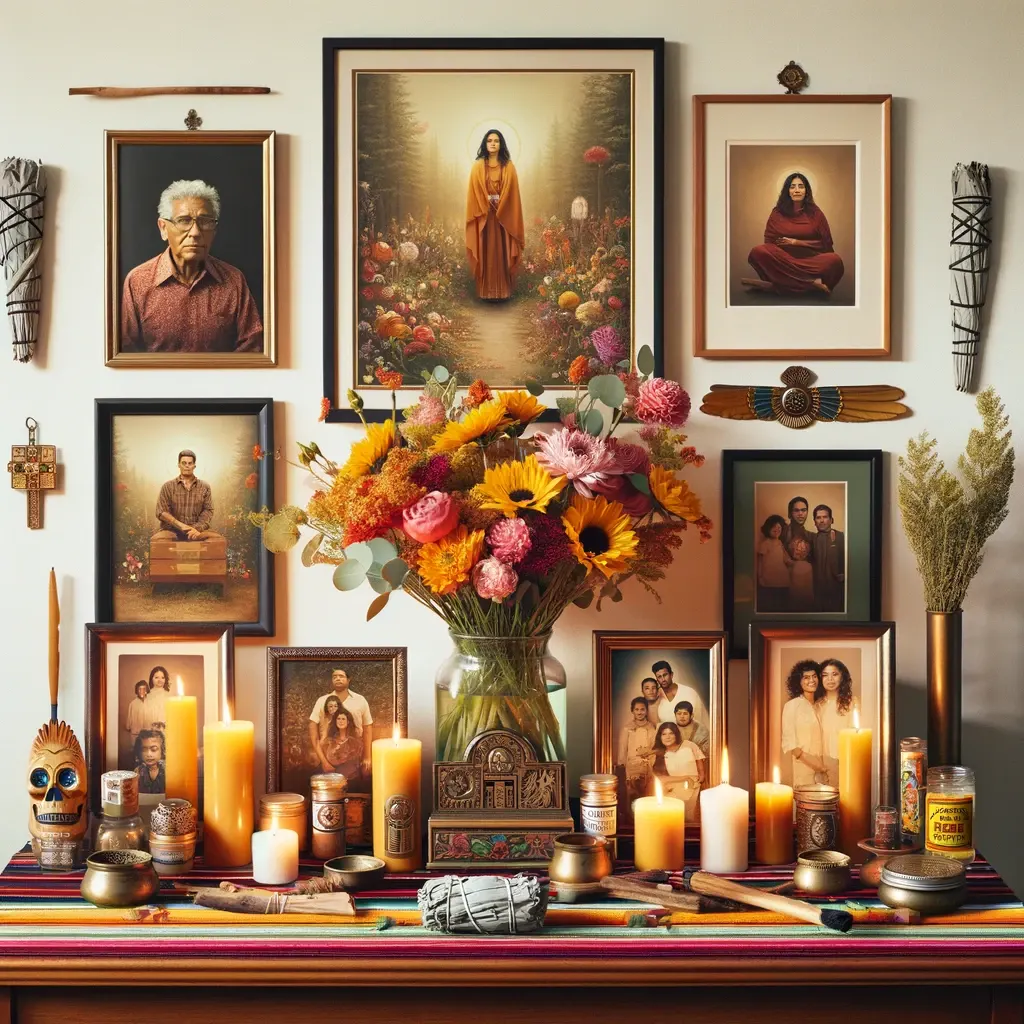Embracing Heritage: Creating an Ancestral Altar to Honor Your Lineage in Sacred Space
"Discover the profound journey of connecting with your roots through the creation of an ancestral altar in your sacred space. This guide will lead you through the meaningful process of honoring your lineage, integrating elements that pay homage to your ancestors. Explore how this spiritual practice deepens your understanding of self and strengthens bonds across generations, enriching your sanctuary with the timeless wisdom and presence of those who came before you."
Introduction: The Significance of Ancestral Veneration
In the tapestry of human culture and spiritual practice, ancestral veneration stands out as a thread that weaves through many traditions, binding the past to the present. This profound respect for ancestors is not merely about remembering those who have passed on but is a recognition of our deep-rooted connections to our lineage, heritage, and the foundational beliefs that shape our existence.

At its core, ancestral veneration is a practice that acknowledges the continuing presence and influence of those who have come before us. It stems from the belief that our ancestors maintain a vested interest in our well-being and continue to offer guidance, wisdom, and protection from the spiritual realm. This practice serves as a bridge across time, allowing us to pay homage to the lives, sacrifices, and lessons of our forebears.
In many cultures, ancestors are revered not only as family members who have passed away but also as spiritual guides and guardians. They are often seen as key figures in the spiritual development of an individual and the community. The veneration of ancestors can take many forms, from simple acts of remembrance to elaborate rituals. It is a way to honor their memory, continue their legacy, and keep their spirit alive within us.
This practice also reflects a universal truth – that we are all part of a continuum, links in an unbroken chain stretching back through generations. By honoring our ancestors, we acknowledge our place in this lineage and recognize that our actions today will echo into the lives of future generations. It is a powerful reminder of our responsibility to uphold the values and traditions passed down to us.
Ancestral veneration also brings a sense of belonging and identity. In a world that often feels transient and disconnected, connecting with our ancestors can provide a sense of grounding and continuity. It's a way to understand who we are and where we come from, giving context to our existence and a deeper appreciation of our heritage.
Furthermore, engaging in ancestral veneration can be a source of healing and reconciliation. It allows us to acknowledge and make peace with the past, including any familial or historical traumas. Through this practice, we can seek to understand and resolve lingering issues that may have been passed down through generations, fostering a sense of peace and closure.
The creation of an ancestral altar is a tangible manifestation of this veneration. It acts as a sacred space where the living can interact with the spirits of their ancestors, offering respect, seeking guidance, and maintaining a spiritual connection that transcends the physical realm. By creating such a space, we open our hearts and homes to the wisdom of the past, allowing it to flow into and enrich our present lives.
In conclusion, the practice of ancestral veneration is much more than a ritualistic homage to those who have passed. It's a celebration of life, a testament to resilience, and a commitment to carrying forth the legacy of those who have shaped our world. It's an acknowledgment that we are never truly alone; we are eternally supported by the love, strength, and spirit of our ancestors. As we embrace this practice, we not only honor those who came before us, but we also lay a foundation of reverence and gratitude for future generations to build upon.
Choosing the Right Location for Your Ancestral Altar
Selecting the ideal location for your ancestral altar is a crucial step in creating a space that truly honors your lineage. This sacred spot becomes a focal point of spiritual energy, connecting you with your ancestors. The right location not only enhances the potency of your veneration but also ensures that the altar aligns harmoniously with your living space and daily life.

Seek a Quiet and Respectful Area:
The altar should be set up in a quiet part of your home where it can remain undisturbed and respected. This could be a seldom-used room, a peaceful corner, or even a dedicated space in your personal study or meditation room. The key is to find a spot that is free from the hustle and bustle of daily activities, offering a serene environment conducive to reflection and connection.
Consider the Direction:
In many cultures, the direction the altar faces holds significant spiritual importance. For instance, some traditions prefer the altar to face east, towards the rising sun, symbolizing new beginnings and enlightenment. Others may choose a direction based on ancestral origins or specific spiritual beliefs. Trust your intuition and consider your cultural background when deciding on the direction.
Ensure Privacy and Accessibility:
While privacy is important, the altar should also be easily accessible for regular engagement and offerings. It should be a space where you can comfortably sit or stand and spend time in reflection or meditation. Avoid placing the altar in overly public or high-traffic areas, as this can disrupt the sanctity and intention of the space.
The Role of Natural Elements:
If possible, incorporate natural elements into or around your altar. Being near a window with natural light or having a plant nearby can create a more vibrant and energetically alive space. However, be mindful of direct sunlight or harsh conditions that could damage the altar elements.
Respect Space Constraints:
Consider the size and layout of your home. Your altar doesn't need to be large; even a small shelf or tabletop can be transformed into a meaningful ancestral space. The importance lies in the intention and respect with which the altar is created and maintained, not in its size.
Harmonizing with Your Living Environment:
The altar should feel like a harmonious part of your home. It should reflect your personal aesthetics and be a space that you are drawn to. Decorating the space surrounding the altar in a way that complements it can help integrate it into your living environment, making it a natural part of your daily life.
Safety Considerations:
Ensure the altar is placed in a safe location, particularly if you are using candles, incense, or other flammable items. It should be out of reach of small children and pets to maintain its sanctity and ensure safety.
In summary, choosing the right location for your ancestral altar is a deeply personal decision that should be made with care and intention. It’s about finding a balance between respect for your ancestors, practicality, and the integration of spiritual practice into your daily life. This sacred space is not just a physical location, but a gateway to connecting with your past, understanding your present, and influencing your future. By selecting the appropriate location, you create a bridge between worlds, opening up a channel for guidance, wisdom, and love from those who have walked the path before you.
Gathering Elements for Your Altar
Creating an ancestral altar involves gathering elements that are not only symbolic but also deeply personal. Each item placed on the altar should resonate with your spirit and have a connection to your ancestors. This process is both introspective and sacred, as it involves selecting items that represent your heritage, memories, and the spiritual bond you share with those who have passed.

Photographs and Heirlooms:
The most poignant elements of any ancestral altar are photographs of deceased family members. Choose photos that evoke fond memories and a sense of connection. Heirlooms or personal belongings of your ancestors can also be powerful additions. These items carry the energy and essence of your loved ones and serve as physical links to the past.
Candles and Lighting:
Candles are a universal symbol of light, guidance, and the spirit. They are used to illuminate the altar, creating a sacred ambiance and serving as a beacon for ancestral spirits. Consider using colors that hold specific meanings, such as white for purity and peace or red for strength and connection.
Incense and Aromatic Elements:
Incense can cleanse the space and create a soothing atmosphere. The act of burning incense can be a ritual in itself, symbolizing the transformation and ascent of prayers to the spiritual realm. Aromatic elements like herbs, oils, or resins that have significance in your family or cultural background can also be included.
Cultural and Spiritual Symbols:
Incorporate items that reflect your cultural heritage or spiritual beliefs. This could include religious icons, traditional artifacts, or symbols that hold special meaning in your family's history. These elements serve as a bridge between your identity and your ancestral roots.
Natural Elements:
Elements from nature like stones, crystals, plants, or water can be used to represent the Earth and the cycle of life. These elements ground the altar and symbolize the natural connection between all generations.
Offerings:
Offerings are a way to provide sustenance and comfort to the spirits of your ancestors. These can include food, drinks, or other items that your ancestors enjoyed or valued in life. The act of offering is a gesture of respect and gratitude.
Personal Touches:
Your altar should also reflect your personal journey and connection with your ancestors. This can include letters, poems, or small tokens that symbolize your relationship with them. Adding these personal touches makes the altar uniquely yours and strengthens the bond with your ancestors.
Seasonal and Ritualistic Items:
Depending on your traditions or the time of year, you might include items that correspond with specific ancestral rituals or seasonal celebrations. This keeps the altar dynamic and aligned with the natural and spiritual cycles.
Incorporating Nature and Elements
Integrating natural elements into your ancestral altar is a powerful way to connect with the earth and the cycle of life, embodying the belief that we are all part of the natural world. Nature and its elements have always been revered in spiritual practices for their symbolic meanings and the energies they bring. Here, we explore how to incorporate these elements into your ancestral altar, enhancing its sacredness and the connection with your ancestors.

The Significance of Natural Elements:
In many spiritual traditions, elements like earth, air, water, and fire are seen as fundamental components of life. They represent different qualities and energies that can be harnessed in your ancestral altar. For instance, earth symbolizes grounding and stability, air signifies communication and intellect, water represents emotion and intuition, and fire embodies transformation and energy.
Earth: The Foundation:
Elements representing earth, such as stones, crystals, or soil, can be placed on your altar to symbolize grounding and the physical connection to the land of your ancestors. These elements remind us of our roots and the enduring presence of our forebears.
Air: The Breath of Life:
To represent air, consider incorporating feathers, incense, or simply allowing fresh air to flow around your altar. This element signifies the breath of life and the spiritual communication between you and your ancestors. The aroma of incense can also act as a medium for sending prayers and intentions to the spirit world.
Water: The Source of Emotion:
Water can be included on your altar through a small bowl of water, seashells, or even a small fountain. It symbolizes the flow of emotions, purification, and the connection to the ancestral spirits. Water is a powerful medium for reflection and emotional release.
Fire: The Flame of Continuity:
Candles are the most common way to incorporate the element of fire. They symbolize the light guiding your ancestors to the altar and represent the eternal flame of their spirit. The act of lighting a candle can be a ritual in itself, signifying reverence and remembrance.
Plants: The Growth of Life:
Adding plants or flowers to your altar connects it to the living energy of nature. Plants symbolize growth, renewal, and the ongoing cycle of life. They bring a vibrant and nurturing energy to your altar, creating a bridge between the living and the ancestral world.
Seasonal Elements:
Consider changing elements with the seasons to reflect the natural cycle and its connection to the cycle of life and death. For example, autumn leaves can represent letting go, while spring flowers can symbolize rebirth and renewal.
Personal and Cultural Significance:
It's important to choose elements that have personal or cultural significance. If a particular stone, plant, or other natural element has a special meaning to your family or cultural background, including it can deepen the connection to your ancestors.
Rituals and Offerings
The ancestral altar is not just a physical space; it's a portal for spiritual connection and communication. Engaging with your altar through rituals and offerings is a powerful way to honor your ancestors, seek their guidance, and maintain a deep, personal connection with them. These practices are the heartbeat of the altar, bringing it to life and keeping the memory and spirit of your ancestors vibrant and present.

The Essence of Rituals:
Rituals are structured, meaningful practices that help connect the spiritual world with the physical. They can range from simple daily acknowledgments to elaborate ceremonies on special occasions. The key is consistency and intention. Regular interaction with your altar keeps the connection with your ancestors strong and clear.
Daily Greetings and Acknowledgments:
A simple yet powerful ritual is to greet your ancestors daily. This can be as straightforward as saying good morning, lighting a candle, or just spending a few moments in quiet reflection at the altar. It establishes a routine of acknowledgment and respect.
Lighting Candles and Incense:
Lighting a candle signifies illumination and guidance, creating a welcoming path for ancestral spirits. Incense can be used to purify the space, carry prayers to the ancestors, and create a serene atmosphere. These acts are rituals in themselves, representing the element of fire and air, and symbolize the transformation of spirit and thought.
Making Offerings:
Offerings are a tangible way to show gratitude and sustenance to your ancestors. These can be foods, drinks, or items that they enjoyed or that have symbolic significance. The act of placing offerings is a gesture of giving back and maintaining a reciprocal relationship with the spirit world.
Special Rituals on Significant Dates:
Anniversaries, birthdays, or culturally significant days are perfect opportunities for special rituals. These can include preparing a favorite meal of your ancestor, sharing stories about them, or performing a specific cultural or family ritual that honors them.
Cleansing and Renewal Rituals:
Regularly cleansing your altar and the items on it is important. This can be done through smudging with sage, palo santo, or other herbs, using sound like bells or singing bowls, or simply dusting and rearranging the elements. This ritual maintains the purity and vibrancy of the altar.
Meditation and Communication:
Spend time meditating at your altar, opening your mind and heart to messages from your ancestors. This can be a time for asking for guidance, seeking wisdom, or simply expressing your thoughts and feelings.
Reflective Journaling:
Keeping a journal near your altar to write down thoughts, experiences, or messages received during meditation can be a powerful practice. It allows for reflection and a deeper understanding of the connection with your ancestors.
Maintaining Your Ancestral Altar
An ancestral altar is not just a static tribute to those who have passed but a living, breathing space that requires care and attention. Maintaining your ancestral altar is an integral part of the practice, ensuring that the space remains a vibrant and sacred conduit for honoring your lineage and connecting with the spirit world.

Regular Cleaning and Care:
The cleanliness of your altar is fundamental. Dust and cleanse the altar regularly to maintain its sanctity. This includes wiping down surfaces, cleaning frames or glass covering photographs, and ensuring any fabric elements are free of dust. This act is not just about physical cleanliness but is a ritual of respect and honor.
Refreshing Offerings:
Offerings such as food, flowers, or water should be refreshed regularly. Stale or wilted offerings can stagnate the energy of the altar. Replacing them is not only an act of care but a renewal of your commitment and gratitude to your ancestors.
Realigning and Reorganizing:
Over time, the arrangement of items on your altar may need realignment. This could be due to practical reasons, like adding new items, or energetic ones, such as changing the layout to reflect a new phase in your life or the seasons. This practice keeps the altar's energy dynamic and aligned with your current spiritual journey.
Energy Cleansing:
Regularly cleanse the energy of your altar using techniques like smudging with sage, palo santo, or other herbs. Sound cleansing with bells, singing bowls, or chanting can also be effective. These practices clear any stagnant or negative energies and refresh the space energetically.
Mindful Interaction:
Each interaction with your altar should be done mindfully. Whether you’re cleaning, rearranging, or simply spending time in its presence, your actions should be intentional and respectful. This mindful interaction fosters a deeper connection with your ancestors and the spiritual realm.
Incorporating Seasonal and Personal Changes:
Reflect changes in seasons, significant personal events, or transitions by incorporating relevant items or rearranging your altar. This could include seasonal decorations, symbols of a recent achievement or life change, or new photographs of ancestors.
Checking In with Your Feelings:
Pay attention to how you feel when you interact with your altar. Your emotions can guide you in understanding what needs to be changed or maintained. The altar should always be a source of comfort, inspiration, and spiritual connection.
Celebrating Ancestral Milestones:
Use your altar to celebrate important dates related to your ancestors, such as birthdays, anniversaries, or cultural festivals. This not only honors them but also serves as a reminder of their continued presence in your life.
"Discover the profound journey of connecting with your roots through the creation of an ancestral altar in your sacred space. This guide will lead you through the meaningful process of honoring your lineage, integrating elements that pay homage to your ancestors. Explore how this spiritual practice deepens your understanding of self and strengthens bonds across generations, enriching your sanctuary with the timeless wisdom and presence of those who came before you."
Introduction: The Significance of Ancestral Veneration
In the tapestry of human culture and spiritual practice, ancestral veneration stands out as a thread that weaves through many traditions, binding the past to the present. This profound respect for ancestors is not merely about remembering those who have passed on but is a recognition of our deep-rooted connections to our lineage, heritage, and the foundational beliefs that shape our existence.

At its core, ancestral veneration is a practice that acknowledges the continuing presence and influence of those who have come before us. It stems from the belief that our ancestors maintain a vested interest in our well-being and continue to offer guidance, wisdom, and protection from the spiritual realm. This practice serves as a bridge across time, allowing us to pay homage to the lives, sacrifices, and lessons of our forebears.
In many cultures, ancestors are revered not only as family members who have passed away but also as spiritual guides and guardians. They are often seen as key figures in the spiritual development of an individual and the community. The veneration of ancestors can take many forms, from simple acts of remembrance to elaborate rituals. It is a way to honor their memory, continue their legacy, and keep their spirit alive within us.
This practice also reflects a universal truth – that we are all part of a continuum, links in an unbroken chain stretching back through generations. By honoring our ancestors, we acknowledge our place in this lineage and recognize that our actions today will echo into the lives of future generations. It is a powerful reminder of our responsibility to uphold the values and traditions passed down to us.
Ancestral veneration also brings a sense of belonging and identity. In a world that often feels transient and disconnected, connecting with our ancestors can provide a sense of grounding and continuity. It's a way to understand who we are and where we come from, giving context to our existence and a deeper appreciation of our heritage.
Furthermore, engaging in ancestral veneration can be a source of healing and reconciliation. It allows us to acknowledge and make peace with the past, including any familial or historical traumas. Through this practice, we can seek to understand and resolve lingering issues that may have been passed down through generations, fostering a sense of peace and closure.
The creation of an ancestral altar is a tangible manifestation of this veneration. It acts as a sacred space where the living can interact with the spirits of their ancestors, offering respect, seeking guidance, and maintaining a spiritual connection that transcends the physical realm. By creating such a space, we open our hearts and homes to the wisdom of the past, allowing it to flow into and enrich our present lives.
In conclusion, the practice of ancestral veneration is much more than a ritualistic homage to those who have passed. It's a celebration of life, a testament to resilience, and a commitment to carrying forth the legacy of those who have shaped our world. It's an acknowledgment that we are never truly alone; we are eternally supported by the love, strength, and spirit of our ancestors. As we embrace this practice, we not only honor those who came before us, but we also lay a foundation of reverence and gratitude for future generations to build upon.
Choosing the Right Location for Your Ancestral Altar
Selecting the ideal location for your ancestral altar is a crucial step in creating a space that truly honors your lineage. This sacred spot becomes a focal point of spiritual energy, connecting you with your ancestors. The right location not only enhances the potency of your veneration but also ensures that the altar aligns harmoniously with your living space and daily life.

Seek a Quiet and Respectful Area:
The altar should be set up in a quiet part of your home where it can remain undisturbed and respected. This could be a seldom-used room, a peaceful corner, or even a dedicated space in your personal study or meditation room. The key is to find a spot that is free from the hustle and bustle of daily activities, offering a serene environment conducive to reflection and connection.
Consider the Direction:
In many cultures, the direction the altar faces holds significant spiritual importance. For instance, some traditions prefer the altar to face east, towards the rising sun, symbolizing new beginnings and enlightenment. Others may choose a direction based on ancestral origins or specific spiritual beliefs. Trust your intuition and consider your cultural background when deciding on the direction.
Ensure Privacy and Accessibility:
While privacy is important, the altar should also be easily accessible for regular engagement and offerings. It should be a space where you can comfortably sit or stand and spend time in reflection or meditation. Avoid placing the altar in overly public or high-traffic areas, as this can disrupt the sanctity and intention of the space.
The Role of Natural Elements:
If possible, incorporate natural elements into or around your altar. Being near a window with natural light or having a plant nearby can create a more vibrant and energetically alive space. However, be mindful of direct sunlight or harsh conditions that could damage the altar elements.
Respect Space Constraints:
Consider the size and layout of your home. Your altar doesn't need to be large; even a small shelf or tabletop can be transformed into a meaningful ancestral space. The importance lies in the intention and respect with which the altar is created and maintained, not in its size.
Harmonizing with Your Living Environment:
The altar should feel like a harmonious part of your home. It should reflect your personal aesthetics and be a space that you are drawn to. Decorating the space surrounding the altar in a way that complements it can help integrate it into your living environment, making it a natural part of your daily life.
Safety Considerations:
Ensure the altar is placed in a safe location, particularly if you are using candles, incense, or other flammable items. It should be out of reach of small children and pets to maintain its sanctity and ensure safety.
In summary, choosing the right location for your ancestral altar is a deeply personal decision that should be made with care and intention. It’s about finding a balance between respect for your ancestors, practicality, and the integration of spiritual practice into your daily life. This sacred space is not just a physical location, but a gateway to connecting with your past, understanding your present, and influencing your future. By selecting the appropriate location, you create a bridge between worlds, opening up a channel for guidance, wisdom, and love from those who have walked the path before you.
Gathering Elements for Your Altar
Creating an ancestral altar involves gathering elements that are not only symbolic but also deeply personal. Each item placed on the altar should resonate with your spirit and have a connection to your ancestors. This process is both introspective and sacred, as it involves selecting items that represent your heritage, memories, and the spiritual bond you share with those who have passed.

Photographs and Heirlooms:
The most poignant elements of any ancestral altar are photographs of deceased family members. Choose photos that evoke fond memories and a sense of connection. Heirlooms or personal belongings of your ancestors can also be powerful additions. These items carry the energy and essence of your loved ones and serve as physical links to the past.
Candles and Lighting:
Candles are a universal symbol of light, guidance, and the spirit. They are used to illuminate the altar, creating a sacred ambiance and serving as a beacon for ancestral spirits. Consider using colors that hold specific meanings, such as white for purity and peace or red for strength and connection.
Incense and Aromatic Elements:
Incense can cleanse the space and create a soothing atmosphere. The act of burning incense can be a ritual in itself, symbolizing the transformation and ascent of prayers to the spiritual realm. Aromatic elements like herbs, oils, or resins that have significance in your family or cultural background can also be included.
Cultural and Spiritual Symbols:
Incorporate items that reflect your cultural heritage or spiritual beliefs. This could include religious icons, traditional artifacts, or symbols that hold special meaning in your family's history. These elements serve as a bridge between your identity and your ancestral roots.
Natural Elements:
Elements from nature like stones, crystals, plants, or water can be used to represent the Earth and the cycle of life. These elements ground the altar and symbolize the natural connection between all generations.
Offerings:
Offerings are a way to provide sustenance and comfort to the spirits of your ancestors. These can include food, drinks, or other items that your ancestors enjoyed or valued in life. The act of offering is a gesture of respect and gratitude.
Personal Touches:
Your altar should also reflect your personal journey and connection with your ancestors. This can include letters, poems, or small tokens that symbolize your relationship with them. Adding these personal touches makes the altar uniquely yours and strengthens the bond with your ancestors.
Seasonal and Ritualistic Items:
Depending on your traditions or the time of year, you might include items that correspond with specific ancestral rituals or seasonal celebrations. This keeps the altar dynamic and aligned with the natural and spiritual cycles.
Incorporating Nature and Elements
Integrating natural elements into your ancestral altar is a powerful way to connect with the earth and the cycle of life, embodying the belief that we are all part of the natural world. Nature and its elements have always been revered in spiritual practices for their symbolic meanings and the energies they bring. Here, we explore how to incorporate these elements into your ancestral altar, enhancing its sacredness and the connection with your ancestors.

The Significance of Natural Elements:
In many spiritual traditions, elements like earth, air, water, and fire are seen as fundamental components of life. They represent different qualities and energies that can be harnessed in your ancestral altar. For instance, earth symbolizes grounding and stability, air signifies communication and intellect, water represents emotion and intuition, and fire embodies transformation and energy.
Earth: The Foundation:
Elements representing earth, such as stones, crystals, or soil, can be placed on your altar to symbolize grounding and the physical connection to the land of your ancestors. These elements remind us of our roots and the enduring presence of our forebears.
Air: The Breath of Life:
To represent air, consider incorporating feathers, incense, or simply allowing fresh air to flow around your altar. This element signifies the breath of life and the spiritual communication between you and your ancestors. The aroma of incense can also act as a medium for sending prayers and intentions to the spirit world.
Water: The Source of Emotion:
Water can be included on your altar through a small bowl of water, seashells, or even a small fountain. It symbolizes the flow of emotions, purification, and the connection to the ancestral spirits. Water is a powerful medium for reflection and emotional release.
Fire: The Flame of Continuity:
Candles are the most common way to incorporate the element of fire. They symbolize the light guiding your ancestors to the altar and represent the eternal flame of their spirit. The act of lighting a candle can be a ritual in itself, signifying reverence and remembrance.
Plants: The Growth of Life:
Adding plants or flowers to your altar connects it to the living energy of nature. Plants symbolize growth, renewal, and the ongoing cycle of life. They bring a vibrant and nurturing energy to your altar, creating a bridge between the living and the ancestral world.
Seasonal Elements:
Consider changing elements with the seasons to reflect the natural cycle and its connection to the cycle of life and death. For example, autumn leaves can represent letting go, while spring flowers can symbolize rebirth and renewal.
Personal and Cultural Significance:
It's important to choose elements that have personal or cultural significance. If a particular stone, plant, or other natural element has a special meaning to your family or cultural background, including it can deepen the connection to your ancestors.
Rituals and Offerings
The ancestral altar is not just a physical space; it's a portal for spiritual connection and communication. Engaging with your altar through rituals and offerings is a powerful way to honor your ancestors, seek their guidance, and maintain a deep, personal connection with them. These practices are the heartbeat of the altar, bringing it to life and keeping the memory and spirit of your ancestors vibrant and present.

The Essence of Rituals:
Rituals are structured, meaningful practices that help connect the spiritual world with the physical. They can range from simple daily acknowledgments to elaborate ceremonies on special occasions. The key is consistency and intention. Regular interaction with your altar keeps the connection with your ancestors strong and clear.
Daily Greetings and Acknowledgments:
A simple yet powerful ritual is to greet your ancestors daily. This can be as straightforward as saying good morning, lighting a candle, or just spending a few moments in quiet reflection at the altar. It establishes a routine of acknowledgment and respect.
Lighting Candles and Incense:
Lighting a candle signifies illumination and guidance, creating a welcoming path for ancestral spirits. Incense can be used to purify the space, carry prayers to the ancestors, and create a serene atmosphere. These acts are rituals in themselves, representing the element of fire and air, and symbolize the transformation of spirit and thought.
Making Offerings:
Offerings are a tangible way to show gratitude and sustenance to your ancestors. These can be foods, drinks, or items that they enjoyed or that have symbolic significance. The act of placing offerings is a gesture of giving back and maintaining a reciprocal relationship with the spirit world.
Special Rituals on Significant Dates:
Anniversaries, birthdays, or culturally significant days are perfect opportunities for special rituals. These can include preparing a favorite meal of your ancestor, sharing stories about them, or performing a specific cultural or family ritual that honors them.
Cleansing and Renewal Rituals:
Regularly cleansing your altar and the items on it is important. This can be done through smudging with sage, palo santo, or other herbs, using sound like bells or singing bowls, or simply dusting and rearranging the elements. This ritual maintains the purity and vibrancy of the altar.
Meditation and Communication:
Spend time meditating at your altar, opening your mind and heart to messages from your ancestors. This can be a time for asking for guidance, seeking wisdom, or simply expressing your thoughts and feelings.
Reflective Journaling:
Keeping a journal near your altar to write down thoughts, experiences, or messages received during meditation can be a powerful practice. It allows for reflection and a deeper understanding of the connection with your ancestors.
Maintaining Your Ancestral Altar
An ancestral altar is not just a static tribute to those who have passed but a living, breathing space that requires care and attention. Maintaining your ancestral altar is an integral part of the practice, ensuring that the space remains a vibrant and sacred conduit for honoring your lineage and connecting with the spirit world.

Regular Cleaning and Care:
The cleanliness of your altar is fundamental. Dust and cleanse the altar regularly to maintain its sanctity. This includes wiping down surfaces, cleaning frames or glass covering photographs, and ensuring any fabric elements are free of dust. This act is not just about physical cleanliness but is a ritual of respect and honor.
Refreshing Offerings:
Offerings such as food, flowers, or water should be refreshed regularly. Stale or wilted offerings can stagnate the energy of the altar. Replacing them is not only an act of care but a renewal of your commitment and gratitude to your ancestors.
Realigning and Reorganizing:
Over time, the arrangement of items on your altar may need realignment. This could be due to practical reasons, like adding new items, or energetic ones, such as changing the layout to reflect a new phase in your life or the seasons. This practice keeps the altar's energy dynamic and aligned with your current spiritual journey.
Energy Cleansing:
Regularly cleanse the energy of your altar using techniques like smudging with sage, palo santo, or other herbs. Sound cleansing with bells, singing bowls, or chanting can also be effective. These practices clear any stagnant or negative energies and refresh the space energetically.
Mindful Interaction:
Each interaction with your altar should be done mindfully. Whether you’re cleaning, rearranging, or simply spending time in its presence, your actions should be intentional and respectful. This mindful interaction fosters a deeper connection with your ancestors and the spiritual realm.
Incorporating Seasonal and Personal Changes:
Reflect changes in seasons, significant personal events, or transitions by incorporating relevant items or rearranging your altar. This could include seasonal decorations, symbols of a recent achievement or life change, or new photographs of ancestors.
Checking In with Your Feelings:
Pay attention to how you feel when you interact with your altar. Your emotions can guide you in understanding what needs to be changed or maintained. The altar should always be a source of comfort, inspiration, and spiritual connection.
Celebrating Ancestral Milestones:
Use your altar to celebrate important dates related to your ancestors, such as birthdays, anniversaries, or cultural festivals. This not only honors them but also serves as a reminder of their continued presence in your life.